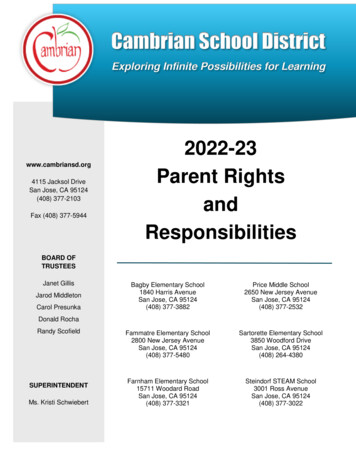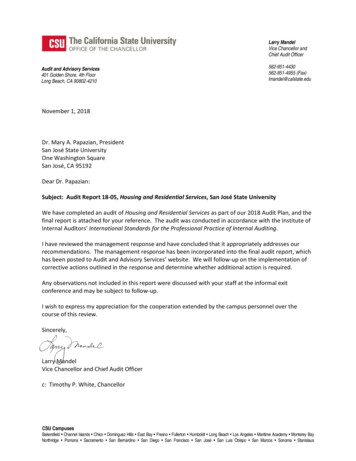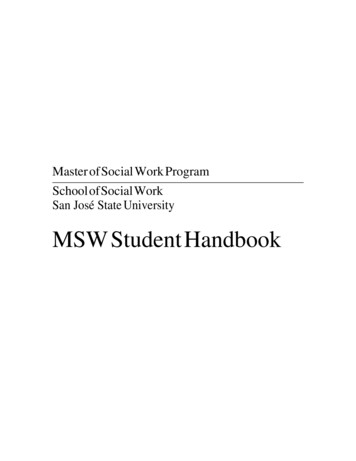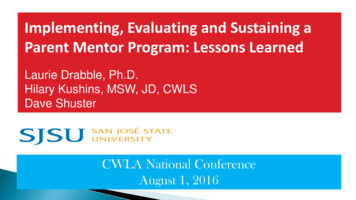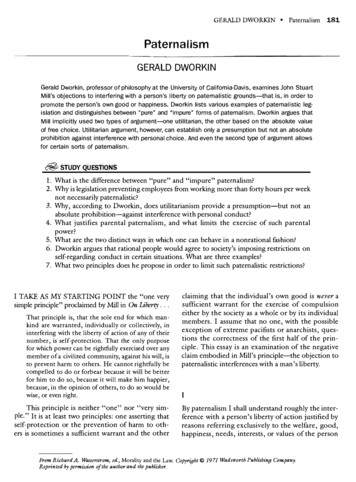
Transcription
GERALD DWORKIN Paternalism181PaternalismGERALD DWORKINGerald Dworkin, professor of philosophy at the University of California-Davis, examines John StuartMill's objections to interfering with a person's liberty on paternalistic grounds-that is, in order topromote the person's own good or happiness. Dworkin lists various examples of paternalistic leg islation and distinguishes between "pure" and "impure" forms of paternalism. Dworkin argues thatMill implicitly used two types of argument-one utilitarian, the other based on the absolute valueof free choice. Utilitarian argument, however, can establish only a presumption but not an absoluteprohibition against interference with personal choice. And even the second type of argument allowsfor certain sorts of paternalism.STUDY QUESTioNS1. What is the difference between "pure" and "impure" paternalism?2. Why is legislation preventing employees from working more than forty hours per weeknot necessarily paternalistic?3. Why, according to Dworkin, does utilitarianism provide a presumption-but not anabsolute prohibition-against interference with personal conduct?4. What justifies parental paternalism, and what limits the exercise of such parentalpower?5. What are the two distinct ways in which one can behave in a nonrational fashion?6. Dworkin argues that rational people would agree to society's imposing restrictions onself-regarding conduct in certain situations. What are three examples?7. What two principles does he propose in order to limit such paternalistic restrictions?I TAKE AS MY STARTING POINT the "one verysimple principle" proclaimed by Mill in On Liberty .That principle is, that the sole end for which man kind are warranted, individually or collectively, ininterfering with the liberty of action of any of theirnumber, is self-protection. That the only purposeclaiming that the individual's own good is never asufficient warrant for the exercise of compulsioneither by the society as a whole or by its individualmembers. I assume that no one, with the possibleexception of extreme pacifists or anarchists, ques tions the correctness of the first half of the prin for which power can be rightfully exercised over anyciple. This essay is an examination of the negativemember of a civilized community, against his will, isclaim embodied in Mill's principle-the objection toto prevent harm to others. He cannot rightfully bepaternalistic interferences with a man's liberty.compelled to do or forbear because it will be betterfor him to do so, because it will make him happier,because, in the opinion of others, to do so would bewise, or even right.This principle is neither "one" nor "very sim ple." It is at least two principles: one asserting thatBy paternalism I shall understand roughly the inter self-protection or the prevention of harm to oth reasons referring exclusively to the welfare, good,ers is sometimes a sufficient warrant and the otherhappiness, needs, interests, or values of the personference with a person's liberty of action justified byFrom Richard A. Wasserstrom, ed.} Morality and the Law. Copyright 1971 Wadsworth Publishing Company.Reprinted by permission ofthe author and the publisher.
182CHAPTER SEVEN Liberty and Paternalismbeing coerced. One is always well-advised to illus trate one's definitions by examples but it is not easyto find "pure" examples of paternalistic interfer ences. For almost any pieceLegislation introducedfor paternalisticmotives may later beadvocated for nonpaternalistic reasons.8. Laws compelling people to spend a specifiedfraction of their income on the purchase ofretirement annuities (Social Security).9. Laws forbidding various forms of gamblingof legislation is justified by(often justified on the grounds that the poorseveral dif ferent kinds ofare more likely to throw away their money onreasons and even if histori cally a piece of legislationcan be shown t o have beenintroduced for purely pater nalistic motives, it may bethat a dvocates of the legislation with an anti paternalistic outlook can find sufficient reasonsjustifying the legislation without appealing to thereasons which were originally adduced to supportit. Thus, for example, it may be that the originallegislation requiring motorcyclists to wear safetysuch activities than the rich who can afford to).10. Laws regulating the maximum rates of interestfor loans.11. Laws against duelling.In addition to laws that attach criminal or civilpenalties to certain kinds of action there are laws,rules, regulations, decrees that make it rather diffi cult or impossible for people to carry out their plansand that are also justified on paternalistic grounds.Examples of this are:helmets was introduced for purely paternalistic rea 1. Laws regulating the types of contracts that willsons. But the Rhode Island Supreme Court recentlybe upheld as valid by the courts, for exampleupheld such legislation on the grounds that it was(an example of Mill's to which I shall return),"not persuaded that the legislature is powerless tono man may make a valid contract for perpetualprohibit individuals from pursuing a course of con duct that could conceivably result in their becom involuntary servitude.2. Not allowing assumption of risk as a defense to aning public charges," thus clearly introducing rea action based on the violation of a safety statute.sons of a quite different kind. Now I regard this3. Not allowing as a defense to a charge of murderdecision as being based on reasoning of a verydubious nature but it illustrates the kind of prob lem one has in finding examples. The following is alist of the kinds of interferences I have in mind asbeing paternalistic.or assault the consent of the victim.4. Requiring members of certain religious sectstohave compulsory blood transfusions.This ismade possible by not allowing the patient tohave recourse to civil suits for assault and bat tery and by means of injunctions.5. Civil commitment procedures when these areIIspecifically justified on the basis of preventing1. Laws requiring motorcyclists to wear safety hel mets when operating their machines.2. Laws forbidding persons from swimming at apublic beach when lifeguards are not on duty.3. Laws making suicide a criminal offense.4. Laws making it illegal for women and childrentowork at certain types of jobs.5. Laws regulating certain kinds of sexual con duct, for example, homosexuality among con senting adults in private.6. Laws regulating the use of certain drugs thatthe person being committed from harminghimself. The D.C. Hospitalization of the Men tally III Act provides for involuntary hospital ization of a person who "is mentally ill, andbecause of that illness, is likely to injure himselfor others if allowed to remain at liberty." Theterm injure in this context applies to uninten tional as well as intentional injuries.All of my examples are of existing restrictions onthe liberty of individuals.Obviously one can think ofinterferences that have not yet been imposed. Thusmay have harmful consequences to the user butone might ban the sale of cigarettes, or require thatdo not lead to antisocial conduct.people wear safety belts in automobiles (as opposed7. Laws requiring a license to engage in certainto merely having them installed), enforcing this byprofessions with those not receiving a licensenot allowing motorists to sue for injuries even whensubject to fine or jail sentence if they do engagecaused by other drivers if the motorist was not wear ing a seat belt at the time of the accident .in the practice.
GERALD DWORKIN Paternalism183that our interference in such cases is just like ourIIIBearing these examples in mind, let me return to acharacterization of paternalism. I said earlier that Imeant by the term, roughly, interference with a per son's liberty for his own good. But, as some of theexamples show, the class of persons whose good isinvolved is not always identical with the class of per sons whose freedom is restricted. Thus, in the caseof professional licensing it is the practitioner who isdirectly interfered with but it is the would-be patientwhose interests are presumably being served. Notallowing the consent of the victim to be a defense tocertain types of crime primarily affects the would-beaggressor but it is the interests of the willing victimthat we are trying to protect. Sometimes a personmay fall into both classes as would be the case if webanned the manufacture and sale of cigarettes and agiven manufacturer happened to be a smoker as well.Thus we may first divide paternalistic inter interference in standard cases of protecting othersfrom harm. At the very least someone interferedwith in this way can reply that no one is complainingabout his activities. It may be that impure paternal ism requires arguments or reasons of a stronger kindin order to be justified, since there are persons whoare losing a portion of their liberty and they do noteven have the solace of having it be done "in theirown interest." Of course in some sense, if pater nalistic justifications are ever correct, then we areprotecting others, we are preventing some frominjuring others, but it is important to see the dif ferences between this and the standard case.Paternalism then will always involve limita tions on the liberty of some individuals in theirown interest but it may also extend to interferenceswith the liberty of parties whose interests are not inquestion.ferences into "pure" and "impure" cases.In "pure"paternalism the class of persons whose freedom isrestricted is identical withPaternalistic interference divides into "pure"and "impure" cases.IVthe class o f persons whoseFinally, by way of some more preliminary analysis,benefit is intended to b eI want to distinguish paternalistic interference withpromoted b y such restric liberty from a related type with which it is oftentions.Examples: the makingconfused. Consider, for example, legislation whichof suicide a crime, requiringforbids employees to work more than, say, fortypassengers in automobiles to wear seat belts, requir hours per week. It is sometimes argued that suching a Christian Scientist to receive a blood transfu legislation is paternalistic for if employees desiredsion. In the case of "impure" paternalism in tryingsuch a restriction on their hours of work they couldto protect the welfare of a class of persons we findagree among themselves to impose it voluntarily.that the only way to do so will involve restricting theBut because they do not the society imposes its ownfreedom of other persons besides those who are ben conception of their best interests upon them by theefitted. Now it might be thought that there are notuse of coercion. Hence this is paternalism.cases of "impure" paternalism since any such caseThere are restrictions which are in the interestscould always be justified on non paternalisticof a class of persons taken collectively but are suchgrounds, that is, in terms of preventing harm to oth that the immediate interesters. Thus we might ban cigarette manufacturersof each individual is fur-from continuing to manufacture their product onthered by his violating thethe grounds that we are preventing them from caus rule when others adhere toing illness to others in the same way that we preventit. In such cases the individ other manufacturers from releasing pollutants intouals involved may need thethe atmosphere, thereby causing danger to theuse of compulsion to giveSometimes individualsmay need c ompulsiont o achieve theirc ollective interest.members of the community. The difference is, how effect to their collective judgment of their own inter ever, that in the former but not the latter case theharm is of such a nature that it could be avoided byest by guaranteeing each individual compliance bythe others. In these cases compulsion is not used tothose individuals affected if they so chose. The incur achieve some benefit which is not recognized to be aring of the harm requires, so to speak, the activebenefit by those concerned, but rather because it iscooperation of the victim. It would be mistakenthe only feasible means of achieving some benefittheoretically and hypocritical in practice to assertwhich is recognized as such by all concerned. This
184CHAPTER SEVEN Liberty and Paternalismway of viewing matters provides us with anothercharacterization of paternalism in general. Paternal ism might be thought of as the use of coercion toachieve a good which is not recognized as such bythose persons for whom the good is intended.Againwhile this formulation captures the heart of thematter-it is surely what Mill is objecting to in OnLiberty-the matter is not always quite like that. Forexample, when we force motorcyclists to wear hel mets we are trying to promote a good-the protec tion of the person from injur y-which is surelyrecognized by most of the individuals concerned. ItThe interference of society to overrule his judgmentand purposes in what only regards himself must begrounded on general presumptions; which may bealtogether wrong, and even if right, are as likely asnot to be misapplied to individual cases.But the strongest of all the arguments against theinterference of the public with purely personal con duct is that when it does interfere, the odds are that itinterferes wronglyand in the wrong place.All errors which [the individual] is likelyto com mit against advice and warning are far outweighed bythe evil of allowing others to constrain him to whatthey deem his good.is not that a cyclist doesn't value his bodily integrity;rather, as a supporter of such legislation would putPerforming the utilitarian calculation by bal it, he either places, perhaps irrationally, anotherancing the advantages and disadvantages, we findvalue or good (freedom from wearing a helmet)that: "Mankind are greater gainers by suffering eachabove that of physical well-being or, perhaps, whileother to live as seems good to themselves, than byrecognizing the danger in the abstract, he eithercompelling each other to live as seems good to thedoes not fully appreciate it or he underestimates therest." .likelihood of its occurring. But now we are approach This is clearly the main channel of Mill's thoughting the question of possible justifications of paternalis and it is one which has been subjected to vigoroustic measures and the rest of this essay will be devotedattack from the moment it appeared-most oftento that question.by fellow utilitarians. The link that they have usu ally seized on is, as Fitzjames Stephen put it in Lib erty, Equality, Fraternity, the absence of proof thatvthe "mass of adults are so well acquainted .vith theirI shall begin for dialectical purposes by discussingthat no compulsion or restraint put upon them byMill's objections to paternalism and then go on todiscuss more positive proposals.An initial feature that strikes one is the absolutenature of Mill's prohibitions against paternalism. Itis so unlike the carefully qualified admonitions ofMill and his fellow utilitarians on other moral issues.He speaks of self-protection as the sole end warrant ing coercion, of the individual's own goals as neverbeing a sufficient warrant.Clearly the operative premise here is.bolsteredby claims about the status of the individual as judgeand appraiser of his welfare, interests, needs, etc.:own interests and so much disposed to pursue themany others for the purpose of promoting their inter est can really promote them." .Now it is interesting to note that Mill himselfwas aware of some of the limitations on the doctrinethat the individual is the best judge of his own inter ests.In his discussion of government intervention ingeneral (even where the intervention does not inter fere .vith liberty but provides alternative institutionsto those of the market) after making claims that areparallel to those just discussed, for example, "Peopleunderstand their own business and their own inter ests better, and care for them more, than the gov With respect to his own feelings and circumstances,ernment does, or can be expected to do," he goesthe most ordinary man or woman has means ofon to an intelligent discussion of the "very large andknowledge immeasurably surpassing those that canconspicuous exceptions" to the maxim.be possessed byanyone else.He is the person most interested in his own well being: the interest which any other person, except incases of strong personal attachment, can have in it istrifling, compared to that which he himself has.In short, we get a presumption, not an absoluteprohibition. The question is why doesn't the argu ment against paternalism go the same way?I suggest that the answer lies in seeing that inaddition to a purely utilitarian argument Mill usesgeneralizations concerning the utility of compulsionanother as well. . . . When Mill states that "thereis a part of the life of every person who has comefor paternalistic purposes:to years of discretion, within which the individualityThese claims are used to support the following
GERALD DWORKIN Paternalism185of that person ought to reign uncontrolled eitherways. There is however an important moral limita by any other person or by the public collectively,"tion on the exercise of such parental power which ishe is saying something about what it means to be aprovided by the notion of the child eventually corn person, an autonomous agent. It is because coercinging to see the correctness of his parent's interven a person for his own good denies this status as antions. Parental paternalism may be thought of as aindependent entity that Mill objects to it so stronglywager by the parent on the child's subsequent rec and in such absolute terms. To be able to choose isognition of the wisdom of the restrictions. There isa good that is independent of the wisdom of what isan emphasis on what could be called future-orientedchosen. A man's "mode of laying out his existenceconsent-on what the child will corne to welcome,is the best, not because it is the best in itself, butrather than on what he does welcome.because it is his own mode." It is the privilege andLet me start by considering a case where theproper condition of a human being, arrived at theconsent is not hypothetical in nature. Under certainmaturity of his facuJties, to use and interpret experi conditions it is rational for an individual to agreeence in his own way.that others should force him to act in ways that,What I have tried to show so far is that there areat the time of action, the individual may not see astwo strains of argument in Mill-one a straight desirable. If, for example, a man knows that he isforward utilitarian mode of reasoning and one whichsubject to breaking his resolves when temptationrelies not on the goods which free choice leads tois present, he may ask a friend to refuse to entertainbut on the absolute value ofhis requests at some later stage.A classical example is given in the Odyssey whenThere are two strainsof argument in Mill.the choice itself. The firstcannot establish any abso Odysseus commands his men to tie him to the mastlute prohibition but at mostand refuse all future orders to be set free, because hea presumption and indeed aknows the power of the Sirens to enchant men withfairly weak one given some fairly plausible assump their songs. Here we are on relatively sound groundtions about human psychology; the second, while ain later refusing Odysseus' request to be set free.stronger line of argument, seems to me to allow onHe may even claim to have changed his mind but,its own grounds a wider range of paternalism thansince it is just such changes that he wished to guardmight be suspected. I turn now to a consideration ofagainst, we are entitled to ignore them.these matters.A process analogous to this may take place on asocial rather than individual basis. An electorate maymandate its representatives to pass legislation whichVIWe might begin looking for principles governing thewhen it comes time to "pay the price" may be unpal atable.I may believe that a tax increase is necessaryto halt inflation though I may resent the lower payacceptable use of paternalistic power in cases wherecheck each month. However in both this case andit is generally agreed that it is legitimate.Even Millthat of Odysseus, the measure to be enforced is spe intends his principles to be applicable only to maturecifically requested by the party involved and at someindividuals, not those in what he calls "nonage."point in time there is genuine consent and agree What is it that justifies us in interfering with chil ment on the part of those persons whose liberty isdren? The fact that they lack some of the emotionalinfringed. Such is not the case for the paternalisticand cognitive capacities required in order to makemeasures we have been speaking about. What mustfully rational decisions. It is an empirical question tobe involved here is not consent to specific measuresjust what extent children have an adequate concep but rather consent to a system of government, runtion of their own present and future interests butby elected representatives, with an understandingthere is not much doubt that there are many defi that they may act to safeguard our interests in cer ciencies. For example, it is very difficult for a childtain limited ways.to defer gratification for any considerable period ofI suggest that since we are all aware of our irra time. Given these deficiencies and given the very realtional propensities, deficiencies in cognitive andand permanent dangers that may befall the child, itemotional capacities, and avoidable and unavoidablebecomes not only permissible but even a duty ofignorance, it is rational and prudent for us to in effectthe parent to restrict the child's freedom in varioustake out "social insurance policies." We may argue
186CHAPTER SEVEN Liberty and Paternalismfor and against proposed paternalistic measures innot a man who for some conscious or unconsciousterms of what fully rational individuals would acceptreasons is trying to injure himself nor is he a manas forms of protection. Now clearly, since the ini tial agreement is not about specific measures we arewho just likes to "live dangerously." I am assum ing that he is like us in all the relevant respects butdealing with a more-or-less blank check and there fore there have to be carefully defined limits.W hatinconvenience-one which does not seem compre I am looking for are certain kinds of conditions whichhensible or reasonable.just puts an enormously high negative value onmake it plausible to suppose that rational men couldIt is always possible, of course, to assimilate thisreach agreement to limit their liberty even whenperson to creatures like myself. I, also, neglect toother men's interests are not affected .Let me suggest types of situations in which itfasten my seat belt and I concede such behavior isnot rational but not because I weigh the inconven seems plausible to suppose that fu!.ly rational indi ience differently from those who fasten the belts.Itwould agree to having paternalistic restric is just that having made (roughly) the same calcu vIn some situations arational person wouldagree to paternalisticrestrictions.tions imposed upon them.lation as everybody else, I ignore it in my actions.It is reasonable to supposeA plausible explanation for this deplorable habit isthat there are "goods" suchthat although I know in some intellectual sense whatas health which any personthe probabilities and risks are I do not fully appreciatewould want to have in orderthem in an emotionally genuine manner.to pursue his own good-noWe have two distinct types of situation in whichmatter how that good isa man acts in a nonrational fashion. In one case heconceived. This is an argument used in connectionattaches incorrect weights to some of his values; inwith compulsory education for children but it seemsthe other he neglects to actto me that it can be extended to other goods whichin accordance with his actualhave this character. Then one could agree that thepreferences and desires.attainment of such goods should be promoted evenClearly there is a strongerwhen not recognized to be such, at the moment, byand more persuasive argu the individuals concerned.An immediate difficulty arises from the fact thatment for paternalism in theThere is a case forpaternalism when aperson neglects hisown preferences.latter situation.Here we aremen are always faced with competing goods andreally not-by assumption-imposing a good onthat there may be reasons why even a value such asanother person. But why may we not extend ourhealth--or indeed life-may be overridden by com interference to what we might call evaluative delu peting values. Thus the problem with the Christiansions? After all, in the case of cognitive delusions weScientist and blood transfusions. It may be moreare prepared, often, to act against the expressed willimportant for him to reject "impure substances"of the person involved. If a man believes that whenthan to go on living. The difficult problem thathe jumps out the window he will float upwards must be faced is whether one can give sense to theRobert Nozick's example-would not we detainnotion of a person irrationally attaching weights tohim, forcibly if necessary? The reply will be that thiscompeting values.man doesn't wish to be injured and if we could con Consider a person who knows the statisticalvince him that he is mistaken as to the consequencesdata on the probability of being injured when notof his action, he would not wish to perform thewearing seat belts in an automobile and knows theaction.But part of what is involved in claiming thattypes and gravity of the various injuries. He alsothe man who doesn't fasten his seat belts is attachingan incorrect weight to the inconvenience of fasteninginsists that the inconvenience attached to fasteningthe belt every time he gets in and out of the car out them is that if he were to be involved in an accidentweighs for him the possible risks to himself. I amand severely injured he would look back and admitinclined in this case to think that such a weighing isthat the inconvenience wasn't as bad as all that.irrational.Given his life plans, which we are assum So there is a sense in which, if! could convince himing are those of the average person, his interests andof the consequences of his action, he also would notcommitments already undertaken, I think it is safewish to continue his present course of action .to predict that we can fmd inconsistencies in his cal Let me now consider another factor which comesculations at some point. I am assuming that this isinto play in some of these situations which may make
GERALD DWORKINan important difference in our willingness to con sent to paternalistic restrictions.Some of the decisions we make are of such a Paternalism187so irreversible. What this would be like in practice isdifficult to envisage and it may be that if no practicalarrangements were feasible we would have to concludecharacter that they produce changes which are inthat there should be no restriction at all on this kind ofone or another way irreversible. Situations are cre action. But we might have a "cooling oW' period, inated in which it is difficult or impossible to return tomuch the same way that we now require couples whoanything like the initial stage at which the decisionfile for divorce to go through a waiting period. Or,was made. In particular, some of these changes willmore far-fetched, we might imagine a Suicide Boardmake it impossible to continue to make reasonedcomposed of a psychologist and another memberchoices in the future. I am thinking specifically ofpicked by the applicant. The Board would be requireddecisions which involve taking drugs that are physi to meet and talk with the person proposing to take hiscally or psychologically addictive and those which arelife, though its approval would not be required.destructive of one's mental and physical capacities.A third class of decisions-these classes are notI suggest we think of the imposition of pater supposed to be disjoint-involves dangers which arenalistic interferences in situations of this kind aseither not sufficiently understood or appreciatedbeing a kind of insurance policy which we take outcorrectly by the persons involved. Let me illustrate,against making decisions which are far-reaching,using the example of cigarette smoking, a number ofpotentially dangerous, and irreversible. Each of thesepossible cases.factors is important.A second class of cases concerns decisions whichare made under extreme psychological and sociologi cal pressures. I am not thinking here of the makingof the decision as being something one is pressuredinto-for example, a good reason for making duellingillegal is that unless this is done many people mighthave to manifest their courage and integrity in waysin which they would rather not do so-but rather ofdecisions, such as that to commit suicide, which areusually made at a point where the individual is notthinking clearly and calmly about the nature of hisdecision.In addition, of course, this comes under1. A man may not know the facts-e.g., smok ing between 1 and 2 packs a day shortens lifeexpectancy 6.2 years, the costs and pain of theillness caused by smoking, etc.2. A man may know the facts, wish to stop smok ing, but not have the requisite willpower.3. A man may know the facts but not have themplay the correct role in his calculation because,say, he discounts the danger psychologicallysince it is remote in time and/or inflates theattractiveness of other consequences of his deci sion which he regards as beneficial.the previous heading of all-too-irrevocable deci In case 1 what is called for is education, the post sions. Now there are practical steps which a societying of warnings, et cetera.In case 2 there is no theo could take if it wanted to decrease the possibility ofretical problem. We are not imposing a good onsuicide
GERALD DWORKIN . Gerald Dworkin, professor of philosophy at the Universiy of California-Davis, examines John Stuart Mill's objections to intefering with a person's liberty on paternalistic grounds-that is, in order to promote the person's own good or happiness. Dworkin lists various examples of paternalistic leg


